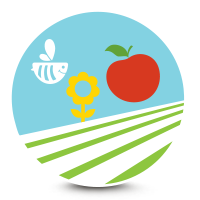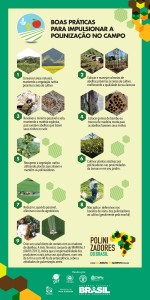
Good practices to boost pollination in the field
Preserve and encourage the presence of pollinators in the field can give great fruit!
FREE BEE, WITHOUT FOOD
Pollination is the process that ensures the production of fruits and seeds and breeding of various plants, one of the main mechanisms maintenance and promotion of biodiversity on Earth. For this to happen, come into play pollinators: bees, wasps, butterflies, birds, bats and some other animals, which are responsible for the transfer of pollen grains from the male flowers to the female flowers of the receiver. In some cases, wind and water are also important actors in this process.
Bees, However, They are by far, the most responsible for the pollination activity. Develop an irreplaceable role, responsible for pollination 70% of crops and 85% of all existing flora in nature, whether in forests, woods or forests.
Worldwide there are over 20 thousand species of bees, and 3 thousand just in Brazil, contributing to the renewal of green areas, and for high productivity and fruit quality in food production.
Many plants and crops depend on specific species of bees to generate its fruits. Therefore, protecting bees and pollinators is usually also ensure the production of food.

AGRICULTURAL PRODUCTION AND THE BEES
Agriculture and pollination go together. Increase production and improve the quality of the fruit are direct benefits obtained by the management of pollination. So, sustainable agriculture should have a close look at the importance of preserving and boosting the pollination activities, understanding this activity as a strategic agricultural production chain.
Best practices to boost pollination
- Conserve natural areas.
- Recover the native vegetation using plants that attract and maintain pollinators.
- Maintain native vegetation next to cultivated area.
- Keep attractive plants nearby.
- Maintain and manage the next bees to crop areas.
- Maintain soil organic matter to create nests.
- Reduce and, when possible, eliminate the use of pesticides.
- Do not apply pesticides on pollinators visiting hours of cultivation, usually in the morning.
- Create a direct channel of contact with beekeepers and beekeepers associations in your area, informing them of activities involving risks to pollinators.

The campaign No Bee, Without food partnered with the Pollinators Project Brazil, to bring important studies about the benefits and management of specific forms of pollination for cotton crops, cashew, canola, chestnut, Apple, melon and tomato, which can be accessed on the site www.semabelhasemalimento.com.br.

Sorry, the comment form is closed at this time.